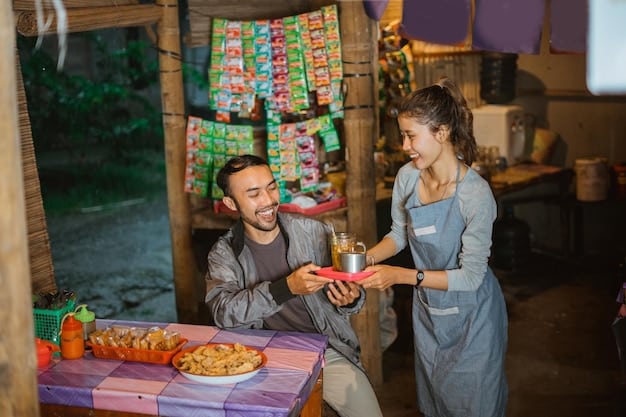Master Travel Negotiation: Spanish, French, Mandarin Skills 2025

Navigating global markets and local interactions requires adept linguistic skills, especially when negotiating prices and experiences abroad; mastering Spanish, French, and Mandarin specifically enhances a traveler’s ability to “negotiate like a local” in diverse cultures by 2025.
Imagine confidently haggling for a hand-woven rug in Marrakech, ordering a precise coffee in a Parisian café, or understanding nuanced directions in a bustling Shanghai market. This level of immersion and command comes from the essential language skills that allow you to truly negotiate like a local: essential language skills for travelers in 2025 (Spanish, French, Mandarin). Beyond basic greetings, linguistic prowess transforms a passive tourist into an engaged participant, unlocking authentic experiences and often, better deals.
The Power of Words: Why Language Matters in Travel
In an increasingly interconnected world, the ability to communicate directly, without an intermediary or translation app, stands as a significant advantage for any traveler. Language opens doors to cultural understanding, fosters genuine connections, and empowers individuals to navigate unfamiliar environments with greater autonomy and confidence. For those seeking to transcend the typical tourist experience, mastering key phrases and negotiation tactics in the local tongue is not merely a convenience but a cornerstone of authentic engagement.
Beyond transactional interactions, language proficiency allows travelers to grasp the subtleties of local customs and social cues. It can mean the difference between a polite refusal and an unintentional offense, or between a missed opportunity and an unforgettable adventure. The act of speaking a few words in a local language often breaks down barriers, inviting smiles and a willingness to assist from residents. This creates a reciprocal exchange of goodwill that enriches the travel experience immensely, moving beyond superficial interactions to genuine human connection.
Beyond the Phrasebook: Conversational Fluency for Authentic Interactions
While a basic phrasebook can offer survival phrases, true negotiation and meaningful interaction demand more than rote memorization. It requires an understanding of conversational flow, contextual nuance, and the ability to adapt to unexpected replies. This level of fluency isn’t about perfectly conjugated verbs, but about confidently engaging in real-time dialogue, even if it’s imperfect. It’s about building rapport, understanding unspoken cues, and responding spontaneously. This ability elevates interactions from functional to truly enriching.
- Active Listening: Pay attention not just to words, but to tone, pace, and emphasis.
- Questioning & Clarifying: Don’t be afraid to ask for repetition or rephrasing if unsure.
- Cultural Nuances: Learn about the non-verbal cues and social rituals that accompany spoken language.
- Adaptability: Be ready to shift your approach based on the other person’s response and demeanor.
The confidence that comes with even rudimentary conversational skills can be truly transformative for a traveler. It allows for spontaneous detours, unexpected discoveries, and a deeper appreciation for the local way of life. This isn’t about becoming bilingual overnight, but about acquiring enough linguistic agility to handle practical situations and foster human connections meaningfully. The investment of time in learning pays dividends in richer, more memorable journeys.
Ultimately, language is the key to unlocking the true essence of a place. It transforms a landscape into a living culture, and strangers into potential friends. For the modern traveler, embracing language learning is an essential step towards becoming a global citizen, capable of navigating and appreciating the world’s diverse tapestry of human expression.
Spanish: The Gateway to Hispanic Cultures
Spanish, with its vibrant cadence and widespread use, is an indispensable language for travelers. Spoken by over 550 million people worldwide, it is the official language in 20 countries, offering an unparalleled gateway to diverse cultures across Europe, Latin America, and even parts of the United States. For travelers, proficiency in Spanish immediately unlocks access to rich histories, lively festivals, and gastronomic delights, allowing for more authentic and engaging experiences than a mere tourist might find.
Practical Spanish Phrases for Travelers and Negotiation
Beyond basic greetings, specific phrases are crucial for navigating commerce and social interactions. Learning how to express needs and engage in polite negotiation can significantly enhance a shopping experience, whether it’s for unique souvenirs in a bustling Latin American market or for street food in Madrid. Understanding numbers, basic pleasantries, and polite forms of refusal or acceptance empowers the traveler to participate actively rather than merely observe. These simple linguistic tools act as social currency, often leading to better prices and more positive interactions.
- “¿Cuánto cuesta?” (How much does it cost?): Your primary question for pricing.
- “¿Es negociable?” (Is it negotiable?): Essential for markets and certain shops.
- “Demasiado caro.” (Too expensive.): To express your budget limitations politely.
- “¿Puede darme un descuento?” (Can you give me a discount?): A direct negotiation phrase.
- “Lo pensaré.” (I’ll think about it.): To create space and avoid immediate pressure.

In many Hispanic cultures, negotiation is not just about price; it’s a social dance, a form of polite interaction. Merchants often appreciate the effort of speaking Spanish, even if imperfectly, as it shows respect for their culture and business. This rapport can often lead to a favorable outcome for both parties, making the transaction a pleasant exchange rather than a mere commercial one. Understanding cultural nuances, like not rushing the negotiation or using polite formal address (“usted”), is as important as the words themselves.
Moreover, linguistic competence extends beyond mere commerce. It facilitates safer travel, as one can ask for directions, understand public announcements, and communicate effectively in emergencies. It also allows for deeper cultural immersion, enabling travelers to learn about local traditions, current events, and daily life directly from the people who live it. This makes Spanish an invaluable asset for anyone looking to truly experience the depth and breadth of Hispanic societies.
French: Navigating Elegance and Efficiency
French, often associated with romance and haute couture, is a language of elegance and precision, yet it is also highly practical for travelers across various regions. As an official language in 29 countries, including France, Canada, numerous African nations, and Caribbean islands, its utility extends far beyond Parisian cafés. Mastering French facilitates not only cultural immersion in these diverse locales but also helps navigate daily life, from ordering a meal to understanding public transport, with a distinct efficiency.
Key Phrases for Commerce and Social Interactions in French
In French-speaking countries, politeness and formality are often paramount in initial interactions. Starting conversations with a polite “Bonjour” or “Bonsoir” and using “Monsieur” or “Madame” can set a positive tone for any exchange, including negotiation. While overt haggling is less common in formal retail settings than in, say, an open-air market, the ability to politely inquire about prices, ask for alternatives, or understand specific terms of sale can be highly beneficial. Understanding the nuances of politeness can also smooth over misunderstandings and facilitate warmer interactions.
- “Combien ça coûte?” (How much does it cost?): The standard price inquiry.
- “Est-ce négociable?” (Is it negotiable?): For situations where bargaining might be acceptable.
- “C’est un peu cher.” (It’s a bit expensive.): A polite way to express reservations about the price.
- “Pourriez-vous faire un geste?” (Could you make a gesture?): A subtle way to ask for a discount.
- “Je réfléchis.” (I’m thinking about it.): To buy time without committing.
When negotiating in French-speaking contexts, especially street markets or flea markets, a polite and respectful approach is key. Avoid aggressive tactics; instead, aim for a friendly rapport. Locals appreciate the effort made to speak their language, and this cultural sensitivity can often lead to a better deal or at least a more pleasant interaction. The ability to articulate your interest, ask relevant questions about an item’s origin or quality, and express appreciation can often build trust, which is a significant factor in any negotiation.
Beyond commercial transactions, French proficiency enhances the overall travel experience by enabling deeper cultural engagement. From understanding museum descriptions to engaging in casual conversations with locals in a park, the language provides access to the subtleties of French culture, art, philosophy, and daily life. It allows travelers to move beyond the superficial tourist experience and connect with the heart of the places they visit, truly appreciating their sophistication and unique charm. Embracing French is an embrace of a rich and influential global heritage.
Mandarin: Unlocking Opportunities in the Fast-Paced East
Mandarin Chinese, with its tonal complexities and vast number of speakers, presents a formidable yet immensely rewarding challenge for the avid traveler. As the most spoken language globally and the official language of the People’s Republic of China, its mastery unlocks unparalleled opportunities for cultural immersion and practical navigation within one of the world’s most dynamic regions. In China’s burgeoning markets, from bustling city souks to modern tech hubs, linguistic ability can transform a traveler’s experience, providing access to authentic interactions and often, better deals.
Essential Phrases for Business and Daily Life in Mandarin
Negotiation in China, particularly in traditional markets, is often an expected part of the transaction process. Unlike fixed-price environments, places like street markets thrive on the back-and-forth of bargaining. Knowing key phrases allows travelers to participate in this cultural exchange confidently, ensuring fair prices and showing respect for local customs. Beyond bargaining, basic Mandarin phrases are crucial for daily necessities, such as asking for directions, ordering food, or communicating needs in public transportation, making independent travel far more manageable and rewarding.
- 多少钱? (Duō shǎo qián? – How much?): Your fundamental question for any price inquiry.
- 太贵了! (Tài guì le! – Too expensive!): An essential declaration to initiate bargaining.
- 便宜一点儿! (Piányi yīdiǎnr! – Cheaper! / A little cheaper!): Direct request for a lower price.
- 我可以买。 (Wǒ kěyǐ mǎi. – I can buy it.): To indicate willingness to purchase if the price is right.
- 谢谢! (Xièxie! – Thank you!): Politeness goes a long way, especially during negotiations.

The practice of negotiation in Chinese markets is often seen as a game, a friendly contest of wills. Vendors expect you to bargain, and often, the initial price they quote is significantly higher than the actual selling price. Engaging in this process demonstrates respect for their culture and business practices. A smile, a calm demeanor, and persistence can often lead to a successful outcome. It’s not just about saving money; it’s about experiencing a vital part of Chinese market culture firsthand.
Furthermore, learning Mandarin enhances safety and convenience. Being able to communicate with taxi drivers, understand announcements, or express medical needs can mitigate potential difficulties in a country where English is not widely spoken outside major tourist areas. It also allows for deeper cultural experiences, such as participating in local festivals, engaging in conversations with curious locals, or exploring less-traveled paths with greater ease and understanding. The effort invested in learning Mandarin is truly an investment in a richer, more profound journey through China and other Mandarin-speaking regions.
Beyond the Basics: Cultural Nuances of Negotiation
True linguistic proficiency for travelers extends far beyond memorizing common phrases; it encompasses an understanding of the cultural nuances that shape communication and negotiation. In many parts of the world, a transaction is not merely an exchange of goods for money, but a social interaction steeped in tradition, respect, and unspoken rules. Ignoring these cultural subtleties can lead to misunderstandings, missed opportunities, or even offense, no matter how perfect one’s grammar might be.
For instance, in some cultures, direct eye contact during negotiation might be seen as aggressive, while in others, it signals sincerity. The pace of conversation, the use of silence, and the appropriate level of formality can vary wildly from one region to another. Understanding these layers of communication allows travelers to adapt their approach, building rapport and demonstrating respect for local customs, which often leads to more favorable outcomes and genuinely positive interactions. It’s the difference between merely speaking words and truly communicating.
Body Language and Tone: The Unspoken Elements of Bargaining
The spoken word is only one component of effective communication; body language, facial expressions, and vocal tone play equally significant roles, especially in the context of negotiation. A friendly smile, an open posture, and a calm, polite tone can signal sincerity and willingness to engage, even if your linguistic skills are limited. Conversely, a tense posture, aggressive gestures, or a demanding tone can quickly shut down any possibility of a favorable deal, regardless of the words being used. These non-verbal cues are universally understood and often speak louder than any translated phrase.
- Eye Contact: Understand cultural norms around direct eye contact; in some places, it’s disrespectful.
- Gestures: Be aware of specific hand gestures that might have different meanings or be considered offensive.
- Proximity: Respect personal space; standing too close can be seen as aggressive in some cultures.
- Facial Expressions: Maintain a pleasant and open expression; a frown or scowl can intimidate.
- Tone of Voice: Keep your voice calm, respectful, and not overly aggressive or loud.
Understanding the interplay between language and culture empowers travelers to navigate complex social situations with grace and effectiveness. It allows for authentic connections with locals, transforming simple transactions into memorable cultural exchanges. This deeper level of understanding is what truly enables a traveler to “negotiate like a local,” blending in with the environment and participating in its rhythm rather than merely passing through. It’s about becoming a participant in the journey, not just a spectator.
Ultimately, becoming culturally aware is an ongoing process of observation, learning, and adaptation. It involves a willingness to make mistakes, to ask questions, and to learn from every interaction. For the modern traveler, this cultural sensitivity is as important as any specific set of phrases, laying the groundwork for truly enriching and successful journeys around the globe.
Advanced Strategies: From Basic Bargaining to Building Relationships
Moving beyond simple transactional negotiations, advanced travelers understand that the truly valuable exchanges often stem from building genuine relationships with locals. This isn’t about manipulating prices, but about fostering trust and understanding that can lead to unique opportunities, personalized experiences, and often, genuine friendships. It leverages linguistic skills not just for commerce, but for connection, recognizing that human interaction is the cornerstone of memorable travel.
This approach involves listening actively, showing genuine curiosity about the other person’s life or trade, and sharing small anecdotes about oneself. It’s about finding common ground, even in a brief encounter, and valuing the person behind the product or service. When vendors or service providers feel respected and understood, they are often more inclined to offer a better deal, insider tips, or an exceptional experience, not because they have to, but because they want to.
Leveraging Politeness and Persistence for Favorable Outcomes
In many cultures, politeness and persistence are powerful tools in negotiation. An overly aggressive or demanding stance can be off-putting and counterproductive. Instead, a calm, respectful, and patient approach often yields better results. This means employing polite forms of address, using “please” and “thank you” frequently, and being willing to engage in a bit of social banter before getting down to brass tacks. It’s about demonstrating that you value the interaction as much as the outcome.
- Start with mutual respect: Always begin with a polite greeting and acknowledge the vendor.
- Patience is key: Do not rush the interaction; allow time for natural conversation to unfold.
- Find common ground: Look for opportunities to connect on a human level beyond the transaction.
- Be appreciative: Express gratitude for their time and consideration, regardless of the outcome.
- Know when to walk away: Sometimes, the best negotiation is knowing when the deal isn’t right.
The art of gentle persistence lies in repeatedly expressing interest and your offer, but always with respect and a smile. It’s about showing that you are serious but also flexible, and that you value the relationship. This layered approach transforms negotiation from a simple haggle over price into a valuable cultural exchange, where both parties gain something more than just material goods. For the truly immersive traveler, this ability to connect is far more valuable than any discounted rate.
Moreover, building relationships goes beyond individual transactions. It can lead to recommendations for other local businesses, invitations to cultural events, or insights into hidden gems not found in guidebooks. This deeper level of engagement enriches travel exponentially, transforming a series of disconnected experiences into a coherent narrative of connection and discovery. It’s about turning a journey into a true exploration of humanity.
Future-Proofing Your Travel Skills: Beyond 2025
As the world continues to evolve with rapid technological advancements and shifting global dynamics, the essential language skills for travelers must also adapt. While mastering Spanish, French, and Mandarin remains invaluable in 2025, future-proofing your travel skills means embracing a continuous learning mindset. This involves not only deepening proficiency in well-established languages but also remaining open to adopting new linguistic tools and leveraging emerging technologies thoughtfully. The key is to enhance, not replace, genuine human interaction.
The landscape of global communication is always changing, with languages gaining or losing prominence, and new digital tools constantly emerging. A truly prepared traveler doesn’t rely solely on a fixed set of skills but cultivates adaptability. This might mean exploring less common regional dialects once on the ground, or integrating AI-powered translation tools as aids rather than substitutes for personal linguistic effort. The goal is always to maximize understanding and connection, regardless of the communication medium.
Integrating Technology Responsibly: AI and Translation Apps
The proliferation of sophisticated AI and translation applications, such as real-time voice translators, has transformed how travelers can bridge linguistic gaps. Such tools are incredibly useful for immediate comprehension, navigation, and even basic transactional exchanges. They can serve as excellent learning aids, providing instant feedback on pronunciation and vocabulary, making the learning process more accessible and engaging than ever before. For specific terms or quick queries, these apps are undoubtedly efficient.
- Use as a supplement: AI tools should support, not replace, learned language skills.
- Clarify complex ideas: For nuanced discussions, human translation or personal skill is still preferred.
- Practice with caution: Be aware that AI translations can sometimes miss cultural context or subtlety.
- Battery dependence: Relying solely on apps makes you vulnerable to power outages or poor connectivity.
- Enhance learning: Use translation apps to look up words or phrases you’ve heard, aiding retention.
However, relying solely on technology for communication can hinder deeper cultural immersion and the development of interpersonal skills. The effort of speaking a local language, even imperfectly, often builds rapport and trust in a way that a machine translation cannot. Locals appreciate the attempt to engage in their language, fostering goodwill and opening doors to more authentic experiences. Technology should be viewed as a powerful enabler, not an ultimate solution, encouraging travelers to blend digital convenience with authentic human effort.
Therefore, future-proofing travel skills means a hybrid approach: building a solid foundation in key languages while remaining agile enough to incorporate new technologies responsibly. It’s about being prepared for any communicative challenge, always prioritizing the human element in interaction. This blend of traditional language learning and technological enhancement ensures that travelers can truly “negotiate like a local” in an ever-evolving world, maintaining curiosity and connection at the heart of their journeys.
| Key Aspect | Brief Description |
|---|---|
| 🗣️ Language Power | Language unlocks cultural understanding, genuine connections, and autonomy in travel. |
| 🌍 Key Languages | Spanish, French, and Mandarin are crucial for negotiation and immersion in diverse regions. |
| 🤝 Cultural Nuances | Beyond words, understanding body language, tone, and social customs is vital for effective bargaining. |
| 💡 Future Readiness | Combine language learning with responsible tech integration for evolving travel demands. |
Frequently Asked Questions
▼
Language proficiency allows travelers to understand local market dynamics, build rapport with vendors, and comprehend cultural nuances essential for effective bargaining. It often leads to better deals and more authentic, respectful interactions, moving beyond a simple transactional exchange.
▼
In 2025, Spanish, French, and Mandarin Chinese remain exceptionally beneficial. Spanish opens doors across Latin America and Spain, French is crucial in Francophone nations, and Mandarin is vital for navigating markets in China and parts of Southeast Asia, offering widespread utility.
▼
To learn essential phrases, utilize language learning apps like Duolingo or Babbel for basic vocabulary and pronunciation. Online resources, YouTube tutorials focusing on travel-specific phrases, and local language classes can also provide a solid foundation for practical communication.
▼
While translation apps offer convenience for quick understanding, relying on them entirely for negotiations is not recommended. They often miss cultural nuances, tone, and context, potentially hindering rapport-building and effective bargaining. Personal effort in communication is always more appreciated.
▼
Cultural nuances, including body language, eye contact, and vocal tone, are as critical as spoken words in negotiation. Understanding these non-verbal cues helps build trust, avoid misunderstandings, and shows respect for local customs, often leading to more favorable or pleasant outcomes.
Conclusion
The landscape of global travel in 2025 underscores an unshakeable truth: true immersion and effective navigation are often propelled by the power of language. While technology provides valuable bridges, the ability to personally “negotiate like a local” through essential language skills, particularly in Spanish, French, and Mandarin, transforms a mere trip into an enriching journey of connection and discovery. Investing in these linguistic capabilities not only secures better deals but, more profoundly, opens doors to authentic cultural experiences, fostering mutual respect and unforgettable memories across diverse societies. The journey ahead promises richer interactions for those willing to speak the world’s languages.





